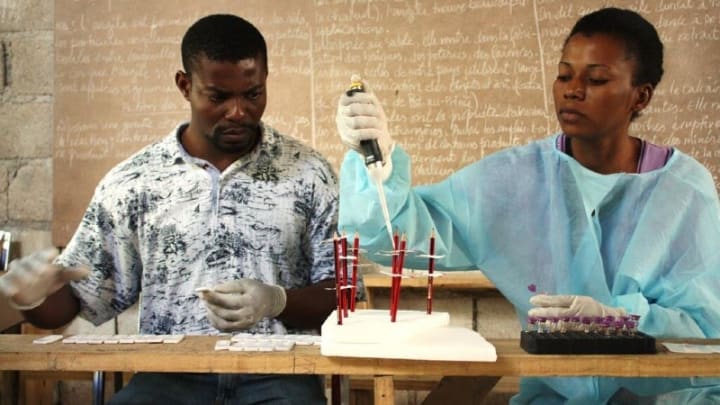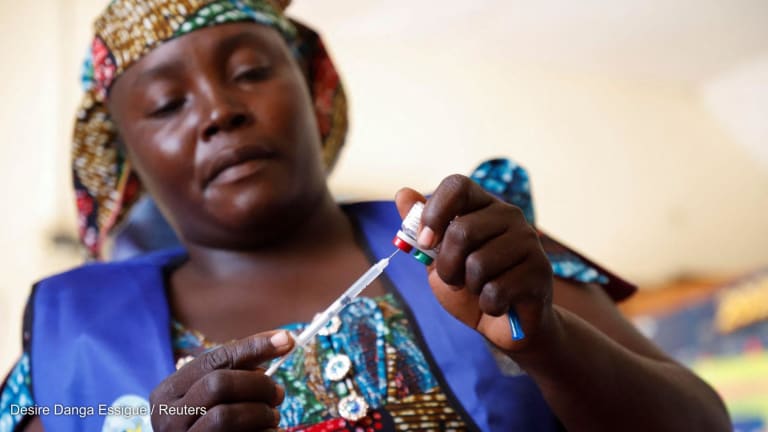
When COVID-19 stopped the world in its tracks, it also threatened to roll back decades of progress against another major public health challenge — malaria. As of last year, malaria mortality rates had declined by 60% since 2000, and significant progress had been made in increased access to bed nets, diagnostics, and treatments. But the World Health Organization estimates that up to 100,000 additional malaria deaths could occur this year as the pandemic disrupts access to these lifesaving tools.
However, we do not have to choose between protecting communities from either COVID-19 or malaria. To save lives, we can, and must, respond to both. Through creativity, innovation, and by bringing diverse partners to the table, we can help build resilient health systems that can respond to a wide range of health threats, not just COVID-19.
Investing in health is good for business
The COVID-19 pandemic has made clear that health challenges pose a threat to businesses, communities, and the entire global economy. But this isn’t just true for COVID-19; malaria is estimated to cost Africa $12 billion per year in lost gross domestic product.
The economic impact of infectious disease threats underscores that everyone has a role to play in driving progress against diseases such as COVID-19 and malaria. Partnership among diverse players is essential and the private sector is a critical player.
Two decades ago, during the construction of a pipeline from Chad to Cameroon, we discovered that the largest single loss of productivity was due to malaria — our workers were becoming infected, or were staying home to care for sick children.
In response, we established a successful program to prevent and treat malaria among our workforce. But just as mosquitoes aren’t confined to worksites, infectious disease threats don’t respect borders or boundaries. It became clear that one of the best ways to protect our employees was to invest in improving health systems in the communities where we operate.
At that time, malaria was a global public health scourge: Cases were going up and a person was more likely to die from the disease than they were 30 years prior. With little political commitment or funding for the disease, no new treatments had been developed in over a decade, and only 2% of households on the African continent had access to a bed net.
Thanks to the efforts of a diverse coalition of partners, that trend was reversed. Since 2000, more than 1.5 billion cases of malaria have been prevented, which translates to over 7.6 million lives saved, according to the World Health Organization.
The private sector has harnessed its unique experience and resources to address unmet needs in the fight against malaria. By leveraging expertise in areas such as innovation and technology, supply chains, and financial management through consultations and training with partners in malaria-endemic countries, the private sector has helped countries strengthen health systems and improve the delivery of lifesaving health services. In doing so, countries have been able to increase capacity to prevent, detect, and rapidly respond to disease outbreaks of all kinds.
Lessons from malaria for COVID-19 and beyond
To be clear, there is still work to do to control malaria worldwide, but reflecting on the progress made against the disease thus far can offer lessons for combatting COVID-19 and other health challenges.
While malaria programs around the world continue to face challenges amid the pandemic, according to the Roll Back Malaria Partnership governments and partners have distributed record numbers of insecticide-treated nets in 2020, pioneering innovative door-to-door campaigns to get them to families most in need.
The success of these efforts is underpinned by two decades of investment in the health infrastructure set up to maintain these services, and efforts from partners to encourage bed net usage and other positive behaviors. Similar lessons can be applied to the COVID-19 response, for example, by encouraging citizens to wear face masks while also ensuring health systems have the capacity to detect, treat, and respond to new cases.
Today, partners on the ground are putting these lessons into practice by finding innovative ways to communicate public health information. For example, Grassroot Soccer — a youth health program — developed and published an open-source, youth-friendly COVID-19 prevention resource, which has been downloaded by hundreds of students. They have also supported communities in accessing health information by designing a mobile game that allows young people in Nigeria and Mozambique to learn about positive health behaviors in a simple and engaging format.
As another example, PATH’s Malaria Vaccine Initiative has worked for years to sensitize communities and policymakers about a groundbreaking malaria vaccine and raise awareness about the safety of vaccines. Thanks to these efforts, Kenya, Malawi, and Ghana have immunized nearly half a million children with the malaria vaccine over the last year as part of a pilot implementation program — in spite of the pandemic.
These efforts to communicate the benefits of vaccines to affected communities will serve as an important foundation for rolling out COVID-19 vaccines once they are approved and available.
These remarkable accomplishments during a global pandemic are a testament to the decades of hard work the global malaria community has invested in this fight and proof that we do not have to put one disease before another.
COVID-19 has revealed that investments in health systems lead to stronger, safer, and more resilient communities by enabling countries to better respond to immediate disease threats while continuing to deliver lifesaving, essential services.
By putting these lessons into action and continuing to invest in health, we can help drive recovery from the pandemic and make progress toward reducing the global burden of malaria, while also improving the resilience of health systems around the world.





